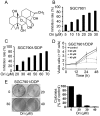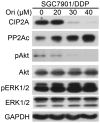Oridonin induces apoptosis and reverses drug resistance in cisplatin resistant human gastric cancer cells
- PMID: 28781688
- PMCID: PMC5530171
- DOI: 10.3892/ol.2017.6421
Oridonin induces apoptosis and reverses drug resistance in cisplatin resistant human gastric cancer cells
Abstract
Gastric cancer is the third most frequent cause of cancer-associated mortality and almost all patients who respond initially to cisplatin (DDP) later develop drug resistance, indicating multi-drug resistance (MDR) is an essential aspect of the failure of treatment. The natural diterpenoid component Oridonin (Ori) has exhibited efficient inhibition in several types of human cancer. However, the effect and potential mechanism of Ori-reversed MDR in human gastric cancer has not been fully elucidated. In the present study, it was found that Ori significantly suppressed DDP-resistant human SGC7901/DDP cell proliferation, growth and colony formation, causing increased caspase-dependent apoptosis, decreased expression of P-glycoprotein (P-gp), encoded by the MDR gene, multi-drug resistance-associated protein (MRP1), and cyclin D1. SGC7901/DDP cells were cultured with different groups of drugs (Ori, DDP alone, or the combination of Ori and DDP). The drug sensitivity, cell apoptosis and effects on MDR were detected by MTT assay and western blot analysis. The results revealed that Ori is able to reverse the DDP resistance and has a clear synergistic effect with DDP in SGC7901/DDP cells by decreasing the levels of P-gp, MRP1, cyclin D1 and cancerous inhibitor of protein phosphatase 2A. Thus, Ori may be a novel effective candidate to treat DDP-resistant human gastric cancer cells.
Keywords: apoptosis; gastric cancer; multi-drug resistance; oridonin.
Figures





Similar articles
-
Celastrol Inhibits the Proliferation and Decreases Drug Resistance of Cisplatin- Resistant Gastric Cancer SGC7901/DDP Cells.Anticancer Agents Med Chem. 2022;22(2):270-279. doi: 10.2174/1871520621666210528144006. Anticancer Agents Med Chem. 2022. PMID: 34053427
-
[Molecular mechanism of cisplatin to enhance the ability of TRAIL in reversing multidrug resistance in gastric cancer cells].Zhonghua Zhong Liu Za Zhi. 2015 Jun;37(6):404-11. Zhonghua Zhong Liu Za Zhi. 2015. PMID: 26463141 Chinese.
-
Oridonin effectively reverses cisplatin drug resistance in human ovarian cancer cells via induction of cell apoptosis and inhibition of matrix metalloproteinase expression.Mol Med Rep. 2016 Apr;13(4):3342-8. doi: 10.3892/mmr.2016.4897. Epub 2016 Feb 16. Mol Med Rep. 2016. PMID: 26935490
-
Annexin A2 is implicated in multi-drug-resistance in gastric cancer through p38MAPK and AKT pathway.Neoplasma. 2014;61(6):627-37. doi: 10.4149/neo_2014_078. Neoplasma. 2014. PMID: 25150310
-
PEITC reverse multi-drug resistance of human gastric cancer SGC7901/DDP cell line.Cell Biol Int. 2014 Apr;38(4):502-10. doi: 10.1002/cbin.10169. Epub 2014 Feb 5. Cell Biol Int. 2014. PMID: 23956061
Cited by
-
Oridonin inhibits VEGF-A-associated angiogenesis and epithelial-mesenchymal transition of breast cancer in vitro and in vivo.Oncol Lett. 2018 Aug;16(2):2289-2298. doi: 10.3892/ol.2018.8943. Epub 2018 Jun 11. Oncol Lett. 2018. PMID: 30008931 Free PMC article.
-
Oridonin inhibited epithelial-mesenchymal transition of laryngeal carcinoma by positively regulating LKB1/AMPK signaling.Int J Med Sci. 2024 Jan 21;21(4):623-632. doi: 10.7150/ijms.92182. eCollection 2024. Int J Med Sci. 2024. PMID: 38464825 Free PMC article.
-
Oridonin enhances antitumor effects of doxorubicin in human osteosarcoma cells.Pharmacol Rep. 2022 Feb;74(1):248-256. doi: 10.1007/s43440-021-00324-1. Epub 2021 Aug 24. Pharmacol Rep. 2022. PMID: 34427908 Free PMC article.
-
Berberine Reverses Breast Cancer Multidrug Resistance Based on Fluorescence Pharmacokinetics In Vitro and In Vivo.ACS Omega. 2021 Apr 13;6(16):10645-10654. doi: 10.1021/acsomega.0c06288. eCollection 2021 Apr 27. ACS Omega. 2021. PMID: 34056218 Free PMC article.
-
Preventive and therapeutic effect of intraportal oridonin on BALb/c nude mice hemispleen model of colon cancer liver metastasis.Transl Cancer Res. 2021 Mar;10(3):1324-1335. doi: 10.21037/tcr-20-3042. Transl Cancer Res. 2021. PMID: 35116458 Free PMC article.
References
-
- Yang X, Cai H, Liang Y, Chen L, Wang X, Si R, Qu K, Jiang Z, Ma B, Miao C, et al. Inhibition of c-Myc by let-7b mimic reverses mutidrug resistance in gastric cancer cells. Oncol Rep. 2015;33:1723–1730. - PubMed
-
- Fan K, Fan D, Cheng LF, Li C. Expression of multidrug resistance-related markers in gastric cancer. Anticancer Res. 2000;20:4809–4814. - PubMed
LinkOut - more resources
Full Text Sources
Other Literature Sources
Research Materials
Miscellaneous
